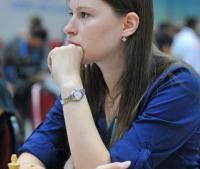
European Club Cup
Right on the heels of the Chess Olympiad came another strong team tournament. The European Club Cup has a long history. The first event of this type was held in 1956. Women’s teams have been participating since 1996. This year the tournament took place at the hospitable city Plovdiv, Bulgaria. Out of 38 players in the world with 2700+ ratings 22 took part, more than half. In the open section the rating-favorite was SOCAR Azerbaijan (Mamedyarov, Radjabov, Grischuk, Shirov, Vachier-Lagrave, Kasimzhanov, Mamedov, Safarli), in the women’s – Monte Carlo Chess Club (Koneru, Hou Yifan, Muzychuk A., Cramling, Skripchenko). By looking at the names the slogan “dream team” jumps to mind. However, the event proved to be challenging for both teams. SOCAR did fight for the medals, but ended up 4th; while Monaco was trailing behind for some time, but eventually managed to win gold for the third time in the club’s history.
I have been playing for AVS from Krasnoturinsk (remember the North Urals Cups?). We (Stefanova, Lahno, me, Muzychuk M., Savina) had a 2nd starting rank and were planning to win the event, but our dreams didn’t come true. Up to round 6 we were in clear first, but then Lahno had to leave for Cap D’Agde, and we lost our momentum, ending up in 5th place. St. Petersburg Club took silver, while Mika Erevan got bronze.
In the open section there were nearly four times more teams than in the women’s, making the struggle even less predictable. To win the trophy for the second year in a row (!), Saratov’s Economist from Russia had to score 13 match points out of 14 (just one draw in the final round). Last year they won all the matches. The team had a 4th starting rank, but friendly relationships and great team spirit have helped Economist emerge victorious once again. Congrats to the team representing my city (Saratov)! Yugra (Russia) came 2nd, A Dzan Dzo (Ukraine) took 3rd.
The format (just 7 rounds) makes the European Club Cup a dynamic and stressful event. Every point is crucial. In the women’s section the competition is somewhat lower, but squandering points is also quite dangerous. Another notable feature is that in the open section each team has 6 main and two reserve players (as opposed to the 4+1 format). In my opinion, this makes the tournament more interesting, balanced, and allows more people to participate.
Regarding my personal experience: I was playing at the European Club Cup for the 4th time in my life. Our best's team result was silver (AVS, 2007); my individual performance – bronze on 1st board (Economist, 2006).
In the first round we were to face ASHDOD from Israel.
My dubious play in the middlegame and a blunder on move 40 led to a risky position. My opponent gave me some tactical chances, but I miscalculated the variation. She didn’t take advantage of the mistake, and the game finally ended in a draw. The rook endgames, no matter how active Black’s pieces were, didn’t pose any real threats for White.



